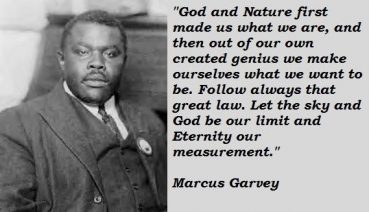We must speak about the Honorable Marcus Garvey if we mention Black philosophy. A tribute to him recognizes his significant influence on the growth of Black consciousness especially from the 1920’s.
The 1920’s to the present
Born in 1887, the 1920’s was the turning point in Garvey’s life. Having travelled all over the world now ready to return to Jamaica from London, Marcus Garvey experienced the reality of some 11 million people in the U.S. and worldwide, yes worldwide. The Caribbean, The Americas, Europe and beyond, listening, hearing , analyzing and recognizing the timeliness and viability of his call. A call for Racial Pride, African Redemption and Self-Reliance. This was the essence of his newly articulated Black philosophy. Why couldn’t Black peoples build a new life which would challenge the economies of the imperialist colonizers?
Kwame Nkrumah put it nicely when he pointed out that Africans should choose to adopt Garvey’s philosophy rather than sell themselves out for a mess of pottage. He like so many Africans leaders realized that the dream of African Redemption was truly possible were we to unite the continent and the Diaspora.
Marcus Garvey’s life was frustrating to him and his faithful followers. Caroline Hossein (2017) points out that he spent a life of ridicule, pointing to his features, his color and his messianic type of oratory. He was even wrongly imprisoned with missing and non-existent evidence. Yet he is still not pardoned. In a way, he died un-fulfilled.
Garvey’s accomplishments in the growth of black philosophy
But looking at his life from a new vantage point 107 years later, we know that with the advent of the UNIA, the black citizen now had at her /his fingertips, a method of economic resilience. As we can see today economies built on social enterprise combine community with social and civil organizations. This is the greatest challenge to large monopolies. Garvey’s philosophy linked this concept with racial justice and in that single move mobilized over 6 million members who realized how quickly they could become self-resilient and independent.
Looking back I think Garvey must have felt a sense of destiny. He was in the company of likeminded people who understood the historical significance of what they were doing. I know these were not women and men laughing and gallivanting behind the scenes. Have you seen pictures of them with broad smiling faces, drink in hand?
Philosophers and idealist are not arrogant. They may appear somewhat arrogant but I think Tony Martin would agree with me that making his well-grounded, precise and tested Black philosophy operational, Garvey tied himself to the lives of those 6 million believers. He knew that his teaching was right about human dignity and human rights.
To be proud of Marcus Garvey
European sovereignty was one experience that must have excited Marcus Garvey. The UNIA members had passports, their own flag, a national anthem rather like what he was seeing with his own eyes in Europe. The concept of Africa for the Africans at home and abroad as a pillar of this new Black philosophy, must have been seen as a rousing call for Pan African sovereignty. Why? It which would bring Black peoples together mentally, emotionally and physically. Only to see it later interpreted as a threat to European sovereignty.
It is our responsibility to chant One God, One Aim, One Destiny and believe in it.


Pingback: WHY JAMAICANS ARE STILL LEARNING ABOUT MARCUS GARVEY » EAW Publications
Pingback: Black History Month: "It's just like fighting for the puck": - EAW Publications